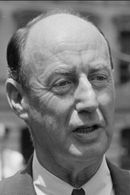Adlai Ewing Stevenson II was born in Los Angeles, California, to a family with a rich political heritage. His grandfather, Adlai Ewing Stevenson, was the second Vice President of the United States under President Grover Cleveland. Stevenson's childhood was marked by a tragic accident in 1912, when he accidentally shot and killed an acquaintance. This event had a profound impact on his life and led him to seek solace in his studies.
Stevenson attended the prestigious Choate School, where he excelled academically. He then served as an apprentice seaman in the United States Navy before graduating from Princeton University in 1922. After failing to complete his law studies at Harvard University, Stevenson transferred to Northwestern University Law School, where he earned his law degree in 1926.
Stevenson's early career was marked by a series of setbacks, including a brief stint as a government lawyer during the early years of the New Deal. However, he bounced back with a series of high-profile appointments, including his role as principal attorney to the Secretary of the Navy during World War II. Stevenson also served as an adviser to the United States delegation to the opening session of the United Nations in 1945.
After the war, Stevenson returned to Illinois, where he became increasingly involved in state politics. In 1947, he was chosen by the powerful Cook County Democratic machine as their candidate for governor, and he went on to win the election in a landslide. During his time in office, Stevenson compiled a moderately progressive record, but he was also dealing with the private agony of the breakup of his 20-year marriage.
Stevenson's success in Illinois politics led to his nomination for president in 1952, and he went on to campaign against Dwight D. Eisenhower with a series of eloquent speeches and witty remarks. Although he lost the election, Stevenson remained a prominent figure in the Democratic Party, and he was nominated again in 1956.
Despite his losses, Stevenson continued to play a significant role in American politics, serving as a titular leader of the Democratic Party and a keeper of the liberal flame during the Eisenhower years. However, his refusal to rule himself out of the running for a third nomination in 1960 permanently damaged his relationship with John F. Kennedy, who ultimately won the nomination and the presidency.
After JFK's election, Stevenson was disappointed to find that he was not appointed Secretary of State, and he instead accepted the post of Ambassador to the United Nations. It was during his time at the UN that Stevenson is perhaps best remembered for his role in the 1962 Cuban Missile Crisis, when he arraigned the Soviet UN envoy, Valerian Zorin, in the "court of world opinion."
Stevenson's time at the UN was marked by increasing stress and isolation, and he eventually suffered a fatal heart attack on a street near the U.S. Embassy in London. Despite his untimely death, Stevenson's legacy as a champion of liberal values and a skilled politician continues to be celebrated to this day.



















